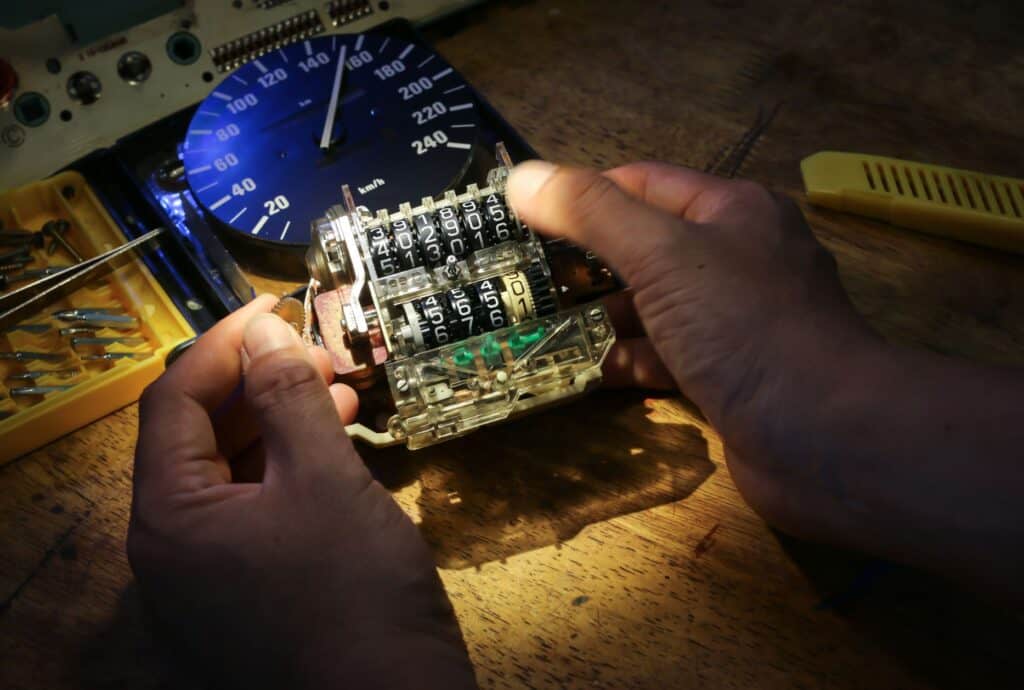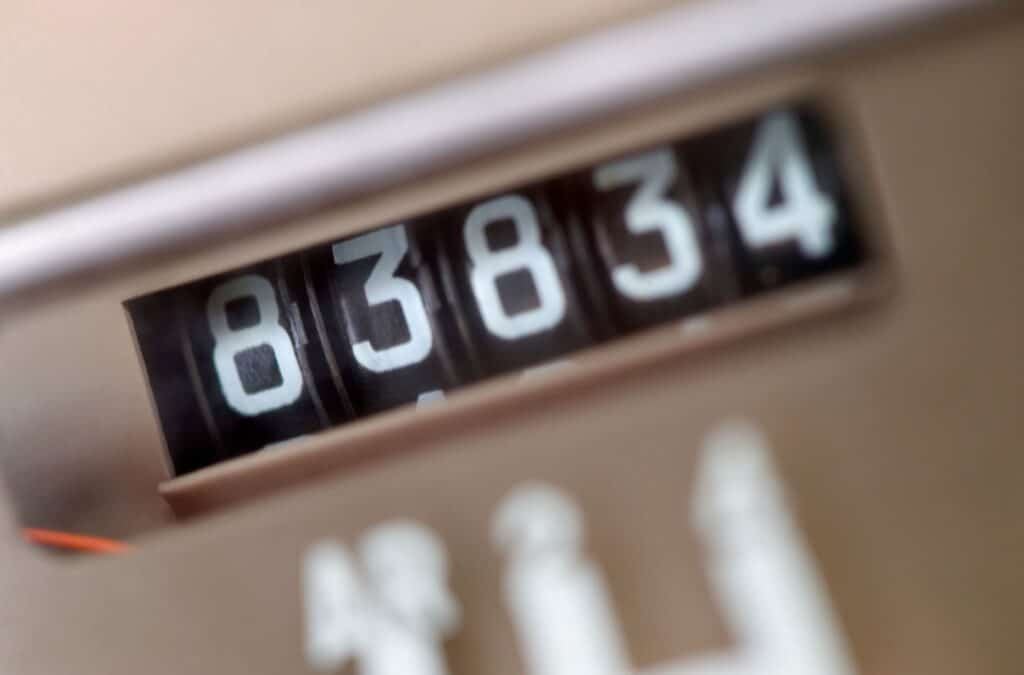It’s a dangerous world out there. It’s not always easy knowing who to trust, especially when buying a used car. Even legitimate-looking dealers can sometimes do unscrupulous things, such as lying about repairs to a car or rolling back the odometer. You might be asking; what do I do if a dealer sold me a car with odometer rollback?
The days of manually rolling back odometer wheels to make a car seem like it has driven fewer kilometers than it has may be almost gone, but modern digital odometers can be tampered with too. In Canada, altering an odometer in this way is illegal, but that doesn’t mean people won’t do it. Larger dealers are unwilling to risk their professional reputation by getting involved with fraud, but smaller dealers may be less honest. And if you buy a car from a private seller, you never really know what you’re dealing with.
That’s why it’s so important to get a full vehicle history report on any vehicle you’re thinking of buying before any money changes hands, whether it’s from a big dealer or a private seller. Use our free VIN checker tool to get information on any odometer rollbacks, as well as a full service history, accident history, and information on any safety recalls of the vehicle.
How To Tell If A Car Odometer Has Been Rolled Back
The condition of the car doesn’t match the odometer reading
Some things really are too good to be true. You may want to believe the low mileage car you’re looking at is legitimate, but that’s not always the case. If a car has very low mileage but shows a lot of wear and tear, that’s a possible sign that the odometer has been rolled back. Check for scratches on paintwork and bumpers, the condition of tires and brakes, and wear on seats and steering wheels. If a car looks worn out but the odometer suggests it hasn’t been driven that much, you may be looking at odometer fraud.
The maintenance records don’t match
Generally, every time a car is serviced by a mechanic, they will record the mileage. If you can get your hands on these records, check the mileage reported to see that it matches what your odometer says. Also, pay attention to the work that has been done on the car. If the car has had its brakes replaced multiple times, for instance, that suggests it’s been driven a lot, so a low odometer reading would be suspicious.
Physical damage to the odometer
This applies more to all the cars with a manual odometer rather than newer digital ones. Check for any chipped paint, misaligned numbers, or new screws around the odometer. These may be signs that the seller has artificially rolled back the mileage on the car.
These are just a few ways to check that the mileage on a car you’re thinking of buying is legitimate. Combined with a comprehensive vehicle history report, these quick checks can help you to avoid being scammed by an unscrupulous dealer.
What Problems Can A Rolled Back Odometer Cause?
Rolling back a car’s odometer is a way of lying about its age. And not in that cute way your aunt does. The value of a used car is inextricably tied to its age and the amount the car has been driven. In fact, the miles a car has covered are more important than its age in years. A 10-year-old car that has barely been driven will be in better condition and therefore more valuable than a five-year-old car that has been driven twice as much.
That’s why some dishonest sellers tamper with the odometer of a car. Making it appear as though it has driven less than it actually has increases the value. This lets them sell a car for more money than it’s really worth.
The downside for you, the purchaser, is that you’re buying a car that may be much older than you initially thought. This can affect every part of the car, from the interior to the engine to the brakes, meaning the parts will wear out faster and you won’t get as much use out of them as you are expecting.
Additionally, if a seller is willing to break the law and tamper with the odometer of the car, it shows they are dishonest. Who knows what else they may have lied about?

What To Do If A Dealer Sold You A Car with Odometer Rollback
If a deal on a car seems too good to be true, it always pays to do some investigating. This is where a comprehensive vehicle history report can save you a fortune, since it may tip you off to odometer rollback or other issues.
If a car you are thinking of buying appears to have had its odometer rolled back, the best thing to do is walk away. Any seller willing to break the law like this is not someone you should even consider doing business with.
Additionally, odometer fraud is a serious crime, so you may want to report the seller to your local police or to the provincial licensing authority. They can flag a car in their system to make it harder for a seller to defraud someone else. Since used car dealers must be licensed in Canada, the provincial authority can also take away their license if they are found guilty of fraud.
Unfortunately, you may not realize you’ve been the victim of odometer fraud until after you have already bought the car. In that case, you should contact the police immediately. They can investigate your claim and help you prosecute the seller.
In some cases, it may be possible to receive compensation for being the victim of odometer fraud. However, this can be challenging, as you will need to take the seller to court. Make sure you document everything and collect as much evidence as you can of the odometer rollback. Service records, statements from previous owners, vehicle history reports, and statements from expert mechanics can all help you prove that you were fraudulently sold a car and make it easier to get your money back through the courts.
Odometer fraud is a serious issue in Canada, and it can happen even at seemingly honest dealerships. That’s why it’s important to look for sellers that you can trust, and use both online reviews and recommendations from friends and family when choosing who you will buy a used car from. It’s also why it’s so important to thoroughly check the history of any car you’re thinking of buying to make sure you don’t become a victim of this type of fraud. Because it’s much easier to walk away from a deal before any money has changed hands than to try and recover your losses once the deal has been made.
Protecting Yourself From Odometer Fraud
Most used car dealers, and even private sellers, are generally honest. And even if they’re not, the legal penalties attached to odometer fraud in Canada are enough to make anyone think twice. If found guilty, sellers face massive fines, losing their licenses, and even jail time.
Still, there will always be some people willing to risk it all and break the law to make some money. That’s why it always pays to be prepared when buying a used car. Try to stick to dealerships that you know are legitimate, or buy cars from private sellers in your social network so that you know you can trust them.
Carefully check over any car you’re thinking of buying, and even consider getting a mechanic to look it over for you. They can tell you if the wear and tear on the car matches the odometer reading. They can also help you check if there’s any physical damage to the odometer, especially if it’s the old-style rolling odometer rather than a new digital one.
It’s also possible for dealers to check the car’s onboard computer, which also keeps a record of the mileage. Don’t be afraid to ask for a reading from this computer to make sure it confirms what the odometer says.
Finally, always be prepared with a vehicle history report. Using our free VIN checker tool will give you a comprehensive vehicle report that can alert you to any signs of odometer rollback. It will also give you a service history of the car that can provide valuable clues as to whether the odometer reading is legitimate.
Buying a car, even a used one, is likely to be one of the biggest purchases you ever make. That’s why it always pays to be careful and make sure you check everything before you hand over your money. Odometer rollback is just one of the ways you can get hurt while buying a used car. So make sure you have all the information you can get your hands on first.
FAQs
How do you know if an odometer has been tampered with?
- Check for physical signs on the odometer such as a damaged display, misaligned numbers, missing or new screws, and chipped paint.
- Look at the wear and tear on the car. Worn tires and brake pads, damaged seats, and a worn-out steering wheel can all suggest that a car may be older than the seller claims.
- Check the vehicle service history to make sure the mileage matches up.
- Get a comprehensive vehicle history report that will tell you of any odometer rollback.
Can dealerships reset an odometer?
Illegal isn’t the same as impossible. There are tools available that can change both a manual and a digital odometer, and unscrupulous dealers will use them to make a car appear newer than it really is.
How common is odometer rollback?
A study in the US in 2002 estimated that around 3.5% of all used cars sold have had their odometer tampered with. There’s no reason to think that numbers in Canada aren’t similar.
Should I buy a with a rolled-back odometer?
Ultimately, it’s up to you. However, buying a car with an altered odometer means you’re buying a car that’s older than it claims to be. It also indicates you’re dealing with a dishonest seller. Finally, having a rolled back odometer in the car can cause you problems when you try to sell it. If a dealer sold you a car with odometer rollback then at the end of the day, that’s illegal, so you need to be careful. You’ll need to be able to demonstrate that you didn’t rollback the odometer, otherwise you could end up in some serious legal trouble. Usually, it’s better to walk away.

